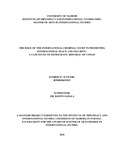| dc.description.abstract | This study is generally about the role of the International Criminal Court (ICC) in the maintenance of international peace and security using the Democratic Republic of Congo (DRC) as a case study. Consequently, it examined the effect that the ICC has had in contributing to peace and security in Africa before discussing the ICC‟s intervention and impact in DRC and finally concluded with a number of recommendations towards making the ICC‟s role more effective in maintenance of international peace and security. The study set out two hypotheses. First, that the ICC has played a significant role in promoting peace and security in the world and secondly that there are impeding factors that promote or impede to the effectiveness of this role. The study, which relied largely on secondary data supported by intermediate primary data from interviews of key informants including a thematic approach to presentation of information, was situated broadly within the idealism theory and within it also located within the liberalism theory.
The study found that the ICC has a significant role to play in the maintenance of international peace and security that has been recognized globally, not only by individual states like the DRC that have referred cases to it, but also from international institutions such as the United Nations Security Council, which has also referred situations such as in Darfur and Libya to the ICC. The study established that the ICC has had both a positive and negative impact on peace and security and has also suffered challenges that have limited its role in promoting peace and security. The place of justice within the peace, security and reconciliation debate has been emphasized in this study, with this concepts being found to be mutually co-existent and not necessarily exclusive of each other. The study found that there are opportunities that exist that would bolster the role of the ICC in the achievement and maintenance of peace and security at national, regional as well as international levels.
Lastly, the study has given recommendations on how to enhance the role of the International Criminal Court as a key global judicial institution in the maintenance of international peace and security. These include the need to have stronger complementary public institutions to the ICC at the national level, ensuring meaningful justice, limiting practices and factors that undermine peace and reconciliation, adoption of integrated approaches to justice and enhancing the universality of international criminal justice through universal ratification and domestication of the Rome Statute of the ICC. | en_US |



